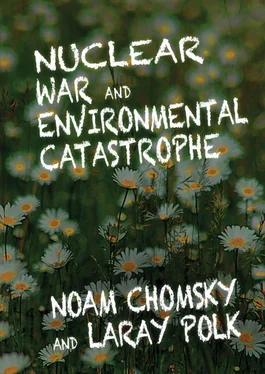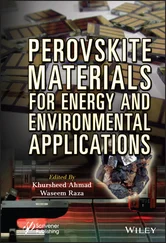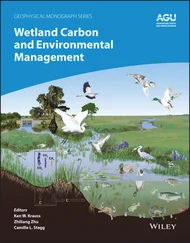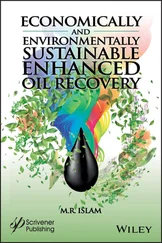Copyright © 2013 by Noam Chomsky and Laray Polk
A Seven Stories Press First Edition
All rights reserved. No part of this book may be reproduced, stored in a retrieval system, or transmitted in any form or by any means, including mechanical, electronic, photocopying, recording, or otherwise, without the prior written permission of the publisher.
Seven Stories Press
140 Watts Street
New York, NY 10013
www.sevenstories.com
College professors may order examination copies of Seven Stories Press titles for a free six-month trial period. To order, visit http://www.sevenstories.com/textbookor send a fax on school letterhead to (212) 226-1411.
Book design by Elizabeth DeLong
Library of Congress Cataloging-in-Publication Data
Chomsky, Noam.
Nuclear war and environmental catastrophe / Noam Chomsky and Laray Polk. — 1st ed.
p. cm.
Includes bibliographical references and index.
ISBN 978-1-60980-454-1 (pbk.)
1. Nuclear warfare—Environmental aspects. 2. Environmental disasters. I. Polk, Laray. II. Title.
QH545.N83C56 2013
363.325’5—dc23
2012046137
Printed in the United States
9 8 7 6 5 4 3 2 1
“To the world’s military leaders, the debate over climate change is long over. They are preparing for a new kind of Cold War in the Arctic, anticipating that rising temperatures there will open up a treasure trove of resources, long-dreamed-of sea lanes and a slew of potential conflicts.” Eric Talmadge, “As Ice Cap Melts, Militaries Vie for Arctic Edge,” Associated Press, April 16, 2012. Areas of future hostilities over oil include the Strait of Hormuz, South China Sea, and Caspian Sea basin. Michael T. Klare, “Danger Waters: The Three Top Hot Spots of Potential Conflict in the Geo-Energy Era,” TomDispatch.com, January 10, 2012. On drilling in the Chukchi and Beaufort seas, see note 3, chap. 1.
In 2005, while deep-water drilling in Angola, an Exxon spokesperson said, “All the easy oil and gas in the world has pretty much been found. Now comes the harder work in finding and producing oil from more challenging environments and work areas.” This is proved to be true as the new frontiers of unconventional oil (Arctic offshore, oil sands, oil shale, pre-salt deepwater, tight oil) involve extreme environmental risk in sensitive areas such as the boreal forest and the world’s oceans. Based on BP’s data, the estimated time span of the “world proved [oil] reserves” in meeting current demand is forty-six years. John Donnelly, “Price Rise and New Deep-Water Technology Opened Up Offshore Drilling,” Boston Globe , December 11, 2005; Mark Finley, “The Oil Market to 2030—Implications for Investment and Policy,” Economics of Energy & Environmental Policy 1, no. 1 (2012): 28, doi:10.5547/2160-5890.1.1.4.
Christian Parenti, Tropic of Chaos: Climate Change and the New Geography of Violence (New York: Nation Books, 2011), 226.
Ley de Derechos de la Madre Tierra, Ley Nro. 071 (Estado Plurinacional de Bolivia December 21, 2010), http://www.gobernabilidad.org.bo/. See also, agenda for “Rights of Mother Earth: Restoring Indigenous Life Ways of Responsibility and Respect,” International Indigenous Conference, Haskell Indian Nations University, Lawrence, Kansas, April 4–6, 2012.
Pres. Nixon advocated for an autonomous regulatory agency for antipollution programs upon entering office. In 1969 Congress passed the National Environmental Policy Act (NEPA); within a year, the Environmental Protection Agency had been established. At the signing of NEPA, Nixon remarked, “[T]he 1970s absolutely must be the years when America pays its debt to the past by reclaiming the purity of its air, its waters, and our living environment. It is literally now or never.” “The Guardian: Origins of the EPA,” EPA Historical Publication-1 (Spring 1992); Dennis C. Williams, “The Guardian: EPA’s Formative Years, 1970–1973,” EPA 202-K-93-002 (September 1993).
With approval from the Obama administration, Royal Dutch Shell began exploratory drilling in the Chukchi and Beaufort seas in summer 2012. However, the inability to respond to changing sea-ice conditions “underscores environmentalists’ concerns that Arctic Ocean conditions are too unpredictable for safe drilling and that industry isn’t up to the challenge.” Companies with similar plans include ExxonMobil (in partnership with Russia’s OAO Rosneft), ConocoPhillips, and Statoil ASA. Tom Fowler, “Shell Races the Ice in Alaska,” Wall Street Journal , August 20, 2012. On activism in Alaska, see Appendix 9.
“In 2009, for the first time, the U.S. Chamber of Commerce surpassed both the Republican and Democratic National Committees on political spending…. Not long ago, the Chamber even filed a brief with the EPA urging the agency not to regulate carbon—should the world’s scientists turn out to be right and the planet heats up, the Chamber advised, ‘populations can acclimatize to warmer climates via a range of behavioral, physiological and technological adaptations.’ As radical goes, demanding that we change our physiology seems right up there.” Bill McKibben, “Global Warming’s Terrifying New Math,” Rolling Stone , August 2, 2012. Four major companies have pulled out of the Chamber over its stance on climate: Apple, Pacific Gas and Electric, PNM Resources, and Exelon. Nike resigned its board position. David A. Fahrenthold, “Apple Leaves U.S. Chamber over Its Climate Position,” Washington Post , October 6, 2009.
Near the end of his presidential bid, Huntsman changed position. On August 18, 2011, Huntsman tweeted, “To be clear. I believe in evolution and trust scientists on global warming. Call me crazy.” At the Heritage Foundation on December 6, 2011, he asserted, “there are questions about the validity of the science, evidenced by one university over in Scotland [ sic ] recently.” Huntsman’s remarks also coincided with an anonymous hacker’s release of stolen e-mails from the University of East Anglia and COP17 proceedings in Durban, South Africa. Evan McMorris-Santoro, “Jon Huntsman’s Climate Change Flip Flop Explained,” TalkingPointsMemo.com, December 6, 2011; Justin Gillis and Leslie Kaufman, “New Trove of Stolen E-mails from Climate Scientists is Released,” New York Times , November 22, 2011. On influence of Tea Party on Republican campaigns, see note 3, chap. 6.
At a rally in Florida, after Hurricane Irene narrowly bypassed the state, Michele Bachmann told the audience: “I don’t know how much God has to do to get the attention of the politicians. We’ve had an earthquake; we’ve had a hurricane. He said, ‘Are you going to start listening to me here?’” Along similar lines, less than a month after the explosion on the Deepwater Horizon oil rig in the Gulf of Mexico, Gov. Rick Perry described the BP spill as an “act of God.” Adam C. Smith, “Michele Bachmann Rally Draws over 1,000 in Sarasota, but Some Prefer Rick Perry,” Tampa Bay Times , August 29, 2011; Peggy Fikac, “Perry Stands by ‘Act of God’ Remark about Spill,” Houston Chronicle , May 5, 2010.
Hugo Chávez, “Chavez Address to the United Nations,” CommonDreams.org, September 20, 2006. On US-Venezuela energy relations, see note 8, this chapter.
“By the 1950s, low-cost oil from abroad, even with a 10 percent tariff and added transportation costs, began to displace American oil in the home market. In 1958, the Eisenhower administration, under pressure from the Texas oil lobby, imposed quotas. These lasted fourteen years and further depleted U.S. Reserves…. In 1959, Venezuela offered to open its domestic market to U.S. exports in exchange for privileged access to the American oil market. When the United States rejected the offer and abrogated a 1939 reciprocal trade agreement, Venezuela approached Saudi Arabia, the largest and lowest cost producer, to join it in convening the founding conference of the Organization of Petroleum Exporting Countries (OPEC) in Baghdad in 1960. OPEC exploited favorable circumstances to raise oil prices fourfold in 1973 and 1974, tenfold by 1981.” Encyclopedia of Tariffs and Trade in U.S. History , ed. Cynthia Clark Northrup and Elaine C. Prange Turney (Westport, CT: Greenwood, 2003), 1:286.
Читать дальше












